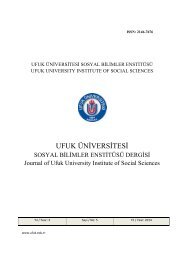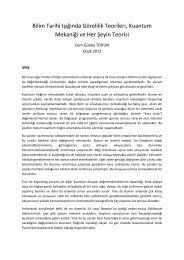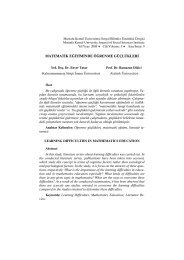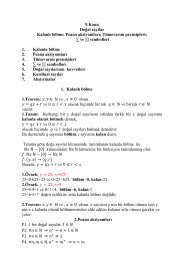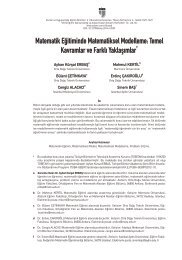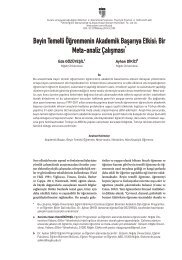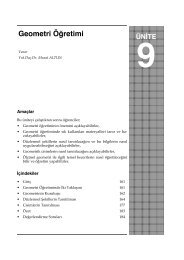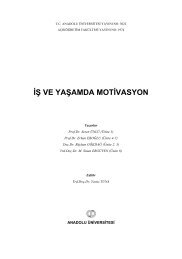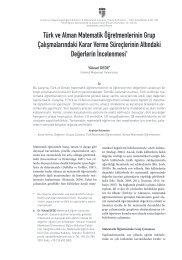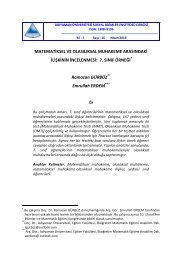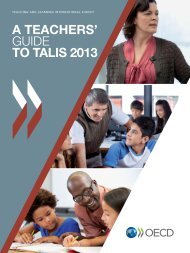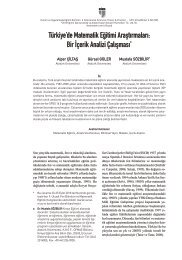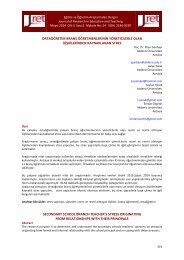NEWSLETTER
2015-12-98
2015-12-98
Create successful ePaper yourself
Turn your PDF publications into a flip-book with our unique Google optimized e-Paper software.
5ECM in Amsterdam<br />
25th Anniversary of the EMS<br />
André Ran (Vrije Universiteit Amsterdam, The Netherlands) and Herman te Riele (CWI, Amsterdam, The Netherlands)<br />
In 2001, the two of us worked<br />
together for the first time on<br />
the organisation of the Dutch<br />
Mathematical Conference,<br />
which is an annual congress<br />
of the Dutch Royal Mathematical<br />
Society (KWG).<br />
Apparently, we did a nice job<br />
because, later in the year, we<br />
received phone calls from our<br />
respective bosses telling us that we were the chosen victims<br />
to try to get the fifth European Congress of Mathematics<br />
to Amsterdam. We said yes (reluctantly) and were<br />
joined by Jan Wiegerinck from the Korteweg-de Vries<br />
Institute of Mathematics of the University of Amsterdam,<br />
making a triumvirate. Thus, it became a joint effort<br />
of the three mathematics institutes in Amsterdam.<br />
In our innocence, we thought we would get it to Amsterdam<br />
and then the big shots in the Dutch mathematical<br />
world would take over to actually organise it. So, we<br />
thought it would be a job spread over a few years, to write<br />
a bid-book and negotiate with the selection committee of<br />
the EMS. No big deal. Boy, how wrong we were.<br />
Initially, everything seemed to go as planned. The bidbook<br />
was a piece of cake and we obtained promises of<br />
support from ministries, the municipality, scientific organisations,<br />
etc. The site visit in 2003 was a very pleasant<br />
experience and, in 2004, the decision was taken that<br />
5ECM would be held in Amsterdam. To get an idea of<br />
what this would entail, the “triumvirate” participated in<br />
4ECM in Stockholm and we got a lot of good ideas. By<br />
then, it was already abundantly clear to us that now we<br />
had secured 5ECM for the Netherlands, and for Amsterdam<br />
in particular, it was up to us to actually organise it.<br />
And then the hard work began. Obviously, many who<br />
had pledged support notified us that that was meant as<br />
support in spirit and not in actual euros. Finding funding<br />
was a constant worry for us but Jan took it upon himself<br />
to organise this and managed to come up with interesting<br />
sponsors. It became clear that support was a matter<br />
of asking the right persons and we finally managed to get<br />
a balanced budget, as well as a nice location. All kinds of<br />
other organisational matters were solved for us by the<br />
people from the organising agency ICS International<br />
Conference Services B.V. (now called MCI Amsterdam).<br />
The matter of a suitable venue was actually solved<br />
during the site visit in 2003. We had several options but<br />
the RAI convention centre in the southern part of town<br />
turned out to be an excellent choice, with several hotels<br />
nearby and easy train connections to Schiphol Airport.<br />
In the meantime, the scientific organising committee,<br />
headed by Lex Schrijver, and the prize committee,<br />
headed by Rob Tijdeman, had jointly put together a very<br />
interesting programme.<br />
By the time the congress was about to start, we still<br />
had some small items on our list to do but, on the weekend<br />
before the congress, these were finally put to rest. On<br />
Monday 14 July 2008 at 8:45 in the morning, about 800<br />
mathematicians from more than 60 European countries<br />
gathered at the RAI convention centre in Amsterdam<br />
for the opening ceremony.<br />
The opening ceremony was a spectacular affair. A<br />
tableau vivante of Rembrandt van Rijn’s most famous<br />
painting “The Nightwatch’’ was created on the stage by a<br />
group of re-enactors. This was accompanied by drum rolls<br />
from the drummers in the painting. In their midst was the<br />
painter himself, who was played by the first speaker of<br />
the opening session Robbert Dijkgraaf, currently Director<br />
of the Institute for Advanced Study in Princeton, at<br />
the time a professor at the University of Amsterdam and<br />
Chairman of the KNAW (Royal Dutch Academy of Sciences).<br />
An excellent opening address by Dijkgraaf was<br />
followed by a warm welcome by Ari Laptev, then president<br />
of the European Mathematical Society. After that<br />
came the ceremony announcing the prize winners: 10<br />
young mathematicians were on stage for the EMS prizes,<br />
together with the winner of the Felix Klein prize. All in<br />
all, the conference was off to a good start.<br />
There were several highlights from the conference: of<br />
course the 10 plenary lectures (including those of Richard<br />
Taylor and László Lovász) and 33 invited lectures, the lectures<br />
by the 10 EMS prize winners sponsored by the Dutch<br />
Foundation Compositio Mathematica: Arthur Avila, Alexei<br />
Borodin, Ben Green, Olga Holtz, Bo’az Klartag, Alexander<br />
Kuznetsov, Assaf Naor, Laure Saint-Raymond, Agata<br />
Smoktunowicz and Cédric Villani, and a lecture by the Felix<br />
Klein prize winner Josselin Garnier. Also, there were<br />
three science lectures: one on quantum information theory<br />
by Ignacio Cirac, one on climate change by Tim Palmer<br />
and one on mathematical biology by Jonathan Sherratt.<br />
The 5ECM conference also incorporated the annual<br />
conference of the Royal Dutch Mathematical So-<br />
EMS Newsletter December 2015 9




